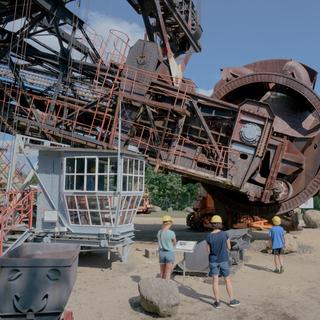


In Germany, economic decline is looming
In DepthGermany, the driving force behind Europe, is currently experiencing severe economic and political turbulence, enough to rekindle deep-seated identity anxieties.
"Hubris," "arrogance," "certainties." These are the words being used this autumn to describe Volkswagen in Wolfsburg, the town created specifically to accommodate the first factories and employees of the famous German automaker, in 1938, between Berlin and Hanover, in the northwestern state of Lower Saxony. This unique city of 126,000 inhabitants is still home to the world's largest automotive plant, on which it is almost entirely dependent, with half the population working there. So much so that Wolfsburg is sometimes nicknamed "Autostadt" ("the city of the car").
With its four immense red-brick chimneys proudly overlooking the Mittelkanal, its thousands of vehicles lined up in the parking lot, its museums, streets and stores selling merchandise bearing the blue "VW" badge, the site has, for the time being, been spared the closures and redundancies planned for other factories in the country. Wolfsburg remains Germany's most prosperous city, where wages are the highest in the country: €46 an hour on average. It's a showcase for "made in Germany," a label synonymous with manufacturing quality and good wages, but concern is palpable.
The automaker, Germany's largest industrial employer, has missed out on the new dawn of the electric car and is planning to close three factories, a first in its history. "This crisis is much more serious than previous ones," said Dennis (who did not wish to give his name), a 50-year-old worker, who has worked at the plant for half his life, and who chain smokes brown cigarettes at the counter of the Bar du Tunnel before going on duty. "We've been making combustion vehicles for over 100 years, but all of a sudden, it's over."
'Damaged symbol'
Every worker knows: It's not just about the factory. Volkswagen is a "miniature Germany," said Dirk Wagner, the chaplain at Wolfsburg, as he greeted the company's employees. "It's a symbol of Germany's post-war economic miracle." And of its dreams of power and grandeur, past and present. "Volkswagen is an identity substitute for Germans," said sociologist Stephan Grünewald, director of the Rheingold opinion institute. "After the war, we looked for national symbols to celebrate: the Deutschmark, the national football team and Volkswagen. It's frightening for German society that such a symbol could be damaged."
More than any other manufacturer, Volkswagen embodies confidence in the strength of the German economy. So much so, in fact, that their destinies are intertwined: The automotive industry as a whole accounts for almost 20% of added value in Germany, and employs, together with subcontractors, more than 800,000 people across the country. That's one in seven jobs, we're used to saying, even if the figure is probably lower. The fact remains that Germany is dependent on it. Too dependent, perhaps.
You have 84.7% of this article left to read. The rest is for subscribers only.
